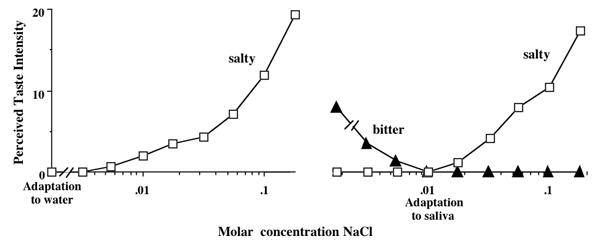Essay 15.2 Water Tastes
Donald McBurney, a student of Carl Pfaffmann, gave us early information about taste receptor mechanisms from his studies on adaptation (Bartoshuk, 1964). Adaptation refers to loss of taste (or any sensation) with constant stimulation. If we flow a taste solution across the tongue (this prevents dilution with saliva), in about 20 seconds the taste will fade to zero. Taste adaptation plays an important role in our daily lives. One of the best demonstrations is adaptation to the NaCl (salt) in our own saliva (see graphs below). McBurney showed that if we rinse our mouths with distilled water and then taste a salt solution of the same NaCl content as saliva, the solution tastes salty. We are normally adapted to the salt in our saliva so we do not taste it; we only taste saltiness from concentrations above that to which we are currently adapted. Bartoshuk showed that if a lower concentration is applied, a different taste results.

Left panel: Perception of saltiness of NaCl for a tongue adapted to distilled water (containing no salt). Right panel: NaCl now only tastes salty if its concentration is above that of the adaptation solution (in this case, saliva). Concentrations lower than the adapting solution now taste bitter.
Thus we see that taste adaptation produces a U-shaped function. The adapted concentration has no taste, higher concentrations have the typical taste of the substance, and lower concentrations take on a new taste. The farther away the test concentration is from the adapted concentration, the more intense the taste. Water is the farthest below adaptation; thus we call the quality resulting from the sub-adapting concentrations “water tastes.” We can make water take on any taste quality by varying the quality of the adapting solution. For example, water following adaptation to dilute acids tastes sweet, water following urea tastes salty, and water following NaCl tastes bitter or sour. Some individuals are able to experience one of the most dramatic water tastes. To a lucky minority, eating globe artichokes makes water taste intensely sweet. Do these individuals have a sweet receptor that others lack? We do not know. Given that not everyone experiences this effect, it is not surprising that there is disagreement among wine experts about the wisdom of serving wine with artichokes.
Reference
Bartoshuk, L. M., McBurney, D. H., and Pfaffmann, C. (1964). Taste of sodium chloride solutions after adaptation to sodium chloride: Implications for the “water taste.” Science. 143: 967–968.